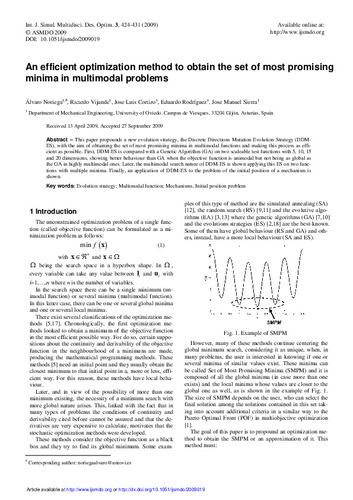An efficient optimization method to obtain the set of most promising minima in multimodal problems
Palabra(s) clave:
Evolution Strategy
Multimodal Function
Mechanisms
Initial Position Problem
Fecha de publicación:
Editorial:
EDP Sciences
Versión del editor:
Citación:
Descripción física:
Resumen:
This paper propounds a new evolution strategy, the Discrete Directions Mutation Evolution Strategy (DDMES), with the aim of obtaining the set of most promising minima in multimodal functions and making this process as efficient as possible. First, DDM-ES is compared with a Genetic Algorithm (GA) on two scaleable test functions with 5, 10, 15 and 20 dimensions, showing better behaviour than GA when the objective function is unimodal but not being as global as the GA in highly multimodal ones. Later, the multimodal search nature of DDM-ES is shown applying this ES on two functions with multiple minima. Finally, an application of DDM-ES to the problem of the initial position of a mechanism is shown.
This paper propounds a new evolution strategy, the Discrete Directions Mutation Evolution Strategy (DDMES), with the aim of obtaining the set of most promising minima in multimodal functions and making this process as efficient as possible. First, DDM-ES is compared with a Genetic Algorithm (GA) on two scaleable test functions with 5, 10, 15 and 20 dimensions, showing better behaviour than GA when the objective function is unimodal but not being as global as the GA in highly multimodal ones. Later, the multimodal search nature of DDM-ES is shown applying this ES on two functions with multiple minima. Finally, an application of DDM-ES to the problem of the initial position of a mechanism is shown.
Colecciones
- Artículos [37556]
- Construcción e Ingeniería de Fabricación [508]
Ficheros en el ítem





